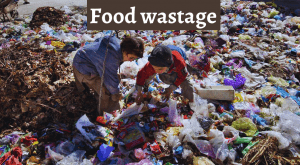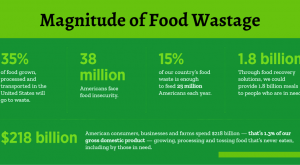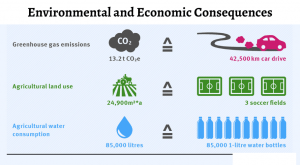Food wastage is a basic issue that presents huge difficulties to nations all over the planet. Pakistan, in spite of its rich social legacy and solid feeling of local area, is wrestling with a disturbing measure of food wastage. This article reveals insight into the causes, outcomes, and likely answers for the developing issue of food wastage in Pakistan.

Introduction
In a nation where a huge piece of the populace battles with food weakness, the wastage of food is a profoundly unsettling issue. In spite of horticultural overflow, Pakistan faces a conundrum of wastage while many go hungry.
The Size of Food Wastage in Pakistan

The peculiarity of wastage of food is an upsetting and profoundly concerning issue that has earned huge consideration, in Pakistan as well as across the globe. Inside the setting of Pakistan, a country with a rich farming legacy and a populace that depends intensely on its produce, the sheer size of food wastage presents an incomprehensible and disturbing situation.
In a country where a significant piece of the populace faces the cruel real factors of food uncertainty, the degree of food wastage becomes an ethical worry as well as a social and monetary mystery. While people and families battle to get their next dinner, a significant part of the produce that could lighten their yearning is lost. This disharmony among overflow and hardship highlights the intricacy of the issue and the earnest requirement for mediation.
The extent of wastage of food in Pakistan can be credited to different elements, each entwined with the other. From an absence of mindfulness and training among makers and shoppers the same, to insufficient capacity and transportation offices that lead to untimely deterioration, the causes are complex and settled in inside the more extensive texture of the country’s food biological system. Market defects, portrayed by fluctuating costs and biased dispersion organizations, likewise contribute essentially to this issue.
The natural and financial implications of such wastage are similarly huge. Past the direct monetary misfortunes caused by makers, food wastage adds to a pattern of destitution by draining assets that could somehow inspire networks. On an ecological level, the wastage of food compares to the wastage of assets – assets that are utilized in the development, transportation, and arrangement of food. The overabundance creation and ensuing removal of uneaten food likewise add to ozone harming substance outflows, further worsening the worldwide test of environmental change.
Underlying drivers of Food Wastage
Absence of Mindfulness and Training
One of the essential explanations behind wastage of food is the absence of mindfulness and training among the two makers and buyers. Numerous ranchers know nothing about present day stockpiling and safeguarding procedures, prompting decay of their produce.
Deficient Capacity and Transportation
Deficient capacity and transportation offices are another main consideration adding to wastage of food. Deficient cold storerooms lead to decay of transient things before they can arrive at the market.
Market Defects
Market defects, for example, value variances and absence of appropriate conveyance organizations, add to food wastage. Ranchers frequently dispose of their produce because of low costs, while customers might not approach reasonable food.
Environmental and Economic Consequences

Influence on Normal Assets
wastage of food not just wastes significant assets like water and land yet additionally worsens ecological issues. The creation of uneaten food adds to ozone harming substance discharges and deforestation.
Monetary Misfortunes and Neediness
The monetary misfortunes coming about because of food wastage are significant. Ranchers lose pay, and the general economy endures. Moreover, the wastage propagates a pattern of destitution and disparity.
Social and Moral Ramifications
Appetite and Hunger
In a nation where a huge part of the populace is malnourished, discarding eatable food is a grave moral concern. Food wastage fuels yearning and unhealthiness among weak gatherings.
Squandered Endeavors and Assets
The endeavors of those engaged with food creation, including ranchers, workers, and producers, go to squander when food is disposed of. Important assets like water, energy, and work are wasted.
Endeavors Towards Decrease
Government Drives
The public authority of Pakistan has perceived the direness of handling food wastage and has acquainted different drives with address the issue. These incorporate advancing present day farming practices and putting resources into capacity and transportation framework.
Non-Legislative Associations (NGOs) and Local area Endeavors
Various NGOs and nearby networks are effectively attempting to battle food wastage. They center around teaching ranchers, further developing storerooms, and rearranging surplus food to those out of luck.
Changing Customer Conduct
Job of Media and Training
Media assumes an essential part in molding public discernment and conduct. Instructive missions can bring issues to light about the outcomes of food wastage and energize dependable utilization.
Individual Obligation
Every individual plays a part to play in lessening food wastage. By settling on cognizant decisions, for example, dinner arranging, legitimate capacity, and keeping away from exorbitant bits, shoppers can add to limiting wastage.
Innovations in Food Management

Cold Storage spaces
Putting resources into cold storage spaces can fundamentally diminish waste and expand the time span of usability of transitory things. This approach can overcome any barrier among market interest.
Esteem Expansion and Safeguarding Methods
Inventive procedures like food protection and esteem expansion can assist ranchers and makers with changing overabundance produce into longer-enduring items, lessening by and large wastage.
Examples of overcoming adversity
Contextual analyses of Compelling Food Dissemination
A few examples of overcoming adversity show the positive effect of productive food dissemination organizations. These drives include joint efforts between partners to guarantee that overflow food arrives at those out of luck.
Future Possibilities
Economical Food Frameworks
Building economical food frameworks that envelop effective creation, circulation, and utilization is essential. This requires aggregate endeavors from state run administrations, organizations, and networks.
Strategy Changes and Coordinated efforts
Extensive arrangement changes, alongside coordinated efforts between the general population and confidential areas, can establish an empowering climate to really battle food wastage.
Conclusion
Resolving the issue of food wastage in Pakistan requires a complex methodology including schooling, mindfulness, strategy changes, and individual activities. By cooperating, Pakistan can make ready for a more manageable and fair food framework.
FAQs
For what reason is food wastage a squeezing worry in Pakistan?
Food wastage compounds hunger, natural issues, and financial misfortunes in Pakistan.
How might people add to diminishing food wastage?
People can lessen food wastage by rehearsing mindful utilization, feast arranging, and appropriate stockpiling.
Which job do NGOs play in battling food wastage?
NGOs assume a significant part in teaching ranchers, further developing storage spaces, and rearranging surplus food to minimized networks.
What might creative methods do in overseeing food wastage?
Inventive methods like food conservation and esteem expansion can change overabundance produce into longer-enduring items, limiting generally speaking wastage.
What is the expected effect of feasible food frameworks?
Reasonable food frameworks can prompt proficient creation, conveyance, and utilization, diminishing both ecological and financial weights.